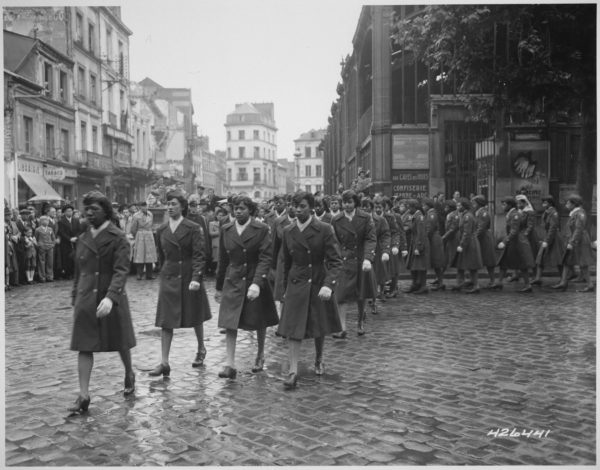More than 70 years after a historic all-Black women’s battalion disbanded with no recognition, the unit is getting its due thanks to a parade celebration and a new documentary.
The Women’s Army Corps 6888 Central Postal Directory Battalion made history during World War II after more than 800 Black women took on the task of sorting through millions of pieces unattended mail for American soldiers, according to the U.S. Army Center of Military History. The women tackled the parcels and letters when they arrived in England in February 1945. They later sailed to France where they continued sorting through the piles of mail.

Nicknamed the “Six Triple Eight,” the unit was honored during a Memorial Day parade in Washington, D.C., WTOP reported.
The Washington Post reported that three veterans from the unit: 95-year-old Deloris L. Ruddock, 96-year-old Indiana Hunt Martin, and 98-year-old Maybelle Rutland Campbell were featured at the Washington event. NBC4 reported on how Martin remembered her WWII service.
“We worked on the mail. You should have seen the pile; oh gosh, boxes falling apart,” Martin recalled to NBC4 of digging through the mail with hundreds of other history makers.
Just weeks later, a documentary chronicling the battalion’s dedication to getting letters from home to American soldiers is set to be screened.
“The Six Triple Eight” will play June 6 at the Milwaukee County War Memorial, according to the Desert Sun.
One of the women interviewed in the Jim Theres-filmed doc is Anna Mae Robertson, who makes one of seven surviving members of the unit. She will also appear during the screening.
“We worked in shifts around the clock. You had to find the right name and address,” the 95-year-old told the Desert Sun of how the battalion got to work on the six-month mail backlog. “You just managed.”
Part of that work was swiftly developing a system upon their arrival to England to track down the 7 million American soldiers who had spread out through Europe. Parcels containing homemade goods were eaten by mice and rats and some mail was only addressed to “Junior, U.S. Army,” the newspaper reported. Additionally, the battalion also had to return mail addressed to soldiers killed in the war. Still, the publication reported 855 women processed 65,000 pieces of mail as they worked eight-hour shifts in less-than-stellar conditions. The buildings where they worked were unheated despite the winter season. The lights were shut off because of attacks coming each night from German pilots and V-2 rockets.
Their hard work meant the mail was disseminated in three months when it had been backlogged for double that amount of time.
In June 1945, the Six Triple Eight continued their work clearing mail in France with French civilians and German POWs working by their side.
At the end of WWII, the unit’s commander, Major Charity Edna Adams, was promoted to Lieutenant Colonel, the Milwaukee Courier reported. It made her making her that highest ranking African-American female in the Army.
By early 1946, the battalion had returned home to the U.S. but there was no fanfare celebrating their contributions. No parade, no formal ceremony or any kind of official recognition was given.
But in 2014, thanks to Democratic Wisconson congresswoman Gwen Moore, Robertson accepted the Women’s Army Corps Medal, American Campaign Medal, European-African-Middle Eastern Campaign Medal, World War II Victory Medal and the Honorable Service Lapel Button WW2, the Desert Sun reported.
Now, the surviving battalion members also have Memorial Day 2019 to look back on as a remembrance of their service.


